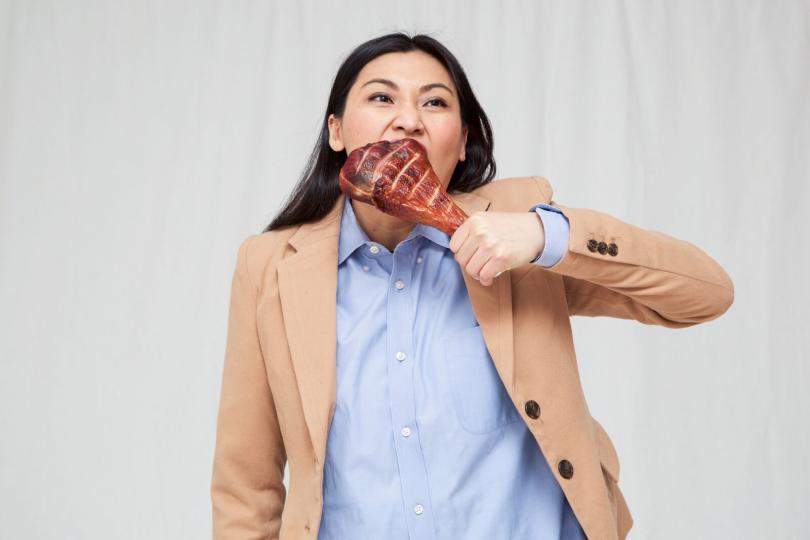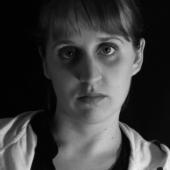Mentorship and Opportunities with Saymoukda Duangphouxay Vongsay

Saymoukda Duangphouxay Vongsay is a poet, playwright, and current Many Voices Fellow at the Playwrights Center. Her play Kung Fu Zombies vs. Cannibals follows two Lao women navigating an apocalypse and broke attendance records for Theater Mu in 2013. We spoke via email.
How did you come to playwriting?
I'm relatively new to playwriting. In 2009, I was living in Mankato and basically soul-dying from the art-desert that was happening in my life. My BFF mentioned to me that she and some POC/I [People of Color/Indigenous] playwrights wanted to start this collective of theater makers who will share resources, information, exchange ideas - basically, to be each others support system. I joined and now I can claim that I've co-founded The Unit Collective.
The Unit was started by several playwrights of color - some who were fellows at the Playwrights Center and some who were from the theater community locally. That first batch of us were me, Jessica Huang, Anton Jones, Indira Addington, Joe Cedillo, Kristoffer Diaz, Eric Sumangil, Reggie Edmund, May Lee-Yang, and Rachel Austin. We curated Madness, an evening of flash plays, at the Playwrights Center once a month. Playwrights had just two weeks to write a piece, then on the day of the performance, the actors and directors had just a couple of hours to rehearse. Everyone volunteered their time. We also provided food and sometimes invited special guest speakers for discussions after performances. It was one of the few spaces where artists of color (playwrights, performers, directors) could play and had autonomy to write what we wanted to write without fearing consequences or criticism for the truths and lived experiences we wanted to address/explore in our work. The PWC was incredible for nurturing us and our series.
The Unit went through several phases, I think. It was open door and many amazing artists came and went for various reasons (starting families, leaving for school, etc). There's no more Unit, unfortunately.
How did you come to the Twin Cities?
I was born in the Nongkhai refugee camp in Thailand. My family got resettlement approvals in 1984 and that's how I got here.
What's your favorite part of the process of bringing a play to the stage? Is there any part you dread?
I love collaborating with the creative team, especially during rehearsals. It's thrilling to see/know how others interpret or envision your words on its feet. A lot of times, their ideas for how a character or scene can live on stage is more dope than my original idea. I'm still learning about the theater world so I wholeheartedly take in what others - especially those who have more experience than me - have to say. At the end of the day, it’s my work, my baby, and I don't have qualms about advocating for my vision - but it takes a community to raise a baby. The part that I dread the most is writing.
What's the hardest thing to explain about being a playwright?
Let's start with this: as a Lao American, its challenging to explain why I am an artist to some people in my community. As refugees, we lost so much during the civil war and Secret War in Laos, that any thought of taking on "luxurious" interests like artmaking, is mostly unsupported - especially more American/Western art forms like theater or spoken word poetry. BUT support from the community is changing for the better and there are more Lao American artists emerging - whether they are practicing more American contemporary art forms or preserving traditional art forms.
What's the best thing a theater can do for a playwright? What should they keep in mind when approaching a new script?
When I inform a theater that I need to cast ethnic Lao actors, it means so much for a theater to say, "We respect that. We will work on this because we understand the reasons why" and then come through with it. As a Southeast Asian - a Lao - playwright, I do not want a theater to say to me, "Hey, we already produced a play about the Vietnam War/refugees/Asians last season. We're not interested in yours because it’s too similar." Don't treat my work and my community's narratives like a quota that's already been met. Shit is varied and nuanced, alright? Judge the work on its own merit. The same theaters that have that perspective are the same ones who will produce and privilege "white" narratives over and over again.
Is there anything that the Twin Cities theater community could be doing differently to support playwrights?
Since I started doing theater, I've been nurtured and supported by the TC theater community. So many people - playwrights, theaters, directors, institutions - have given me opportunities to expand what I know about theatermaking.
Can you give some specific examples of the kind of opportunities and support you've gotten from theater companies?
They literally gave me money to discover myself as a playwright. I was a poet before I became a playwright. They made me a legitimate professional playwright. Because of them, a Lao-centered narrative was put onto the American stage. Lao people have been in Minnesota for nearly 40 years at that time and it took 38 years until a Minnesota theater company produced a play that privileged Lao experiences.
I received mentorship from Rick Shiomi and Randy Reyes while writing the script for Kung Fu Zombies vs Cannibals. I got to workshop and had staged readings. Randy was active in getting KFZ out there - I got to visit classrooms and other theaters to talk about the play, for example. A fight scene from KFZ made it on the Ivey Award stage one year. They gave me a lot of exposure, too.
I became part of a writing team - made up of all women - which felt very special to me. Everyone on the team was more experienced than me and I gained different playwriting tools from them. My friend Jessica Huang invited me to that table.
This joint is run by my BFF May Lee-Yang. She's Hmong American and like me, want to create theater on her own terms. We co-wrote and co-performed our Hmong Lao Friendship Play. I learned about self-producing through that experience.
TeAda Productions (based in Los Angeles)
They introduced me about the ensemble process and also to the practice of bringing in community to tell their stories. Then, lifting up those stories and those truths through theater. I learned how to play with others while devising the work and how to engage community members when gathering their stories. I spent two weeks in LA at East West Players (the largest leading APIA theater company in America) in a residency with TeAda learning about ensemble work.
The Many Voices Fellowship was the only fellowship I actually really wanted and tried year after year after year to get. They're providing opportunities to work with their established artists - like, being mentored by Christina Ham (FTW?!) - workshop our play, connecting us to artistic directors, theaters, theater makers nationally, bringing us to Chicago to introduce us to the theater landscape there, and aside from all of these professional and creative opportunities, they are giving us a solid stack - not $1,000 like other fellowships across the nation but legit money. FTW!
Why should companies do new work?
Because new work usually reflects NOW. Oldies can be goodies but my friends and I are interested in discovering contemporary voices and stories that are commentaries on our realities right now.




